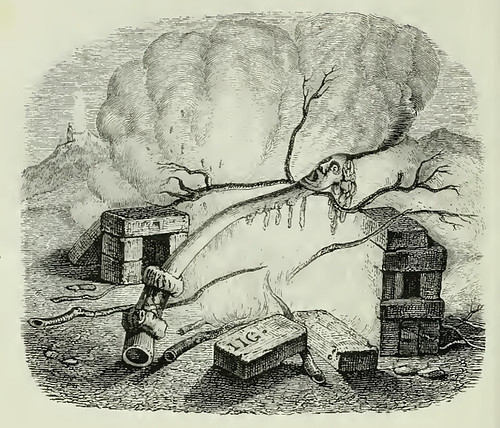HODIE: ante diem tertium decimum Kalendas Maias.
GOOGLE BOOKS: Today's Google Books are Bidermann's Epigrammatum libri tres and Böcken's Manuale Sacrorum Epigrammatum.
MYTHS and LEGENDS: The art image for today's legend shows The Abduction of Ganymede; you can also see the legends for the current week listed together here.

TODAY'S DISTICHS and EMBLEMS: All the distichs come with vocabulary lists!
RHYMING DISTICHS: The two new Rhyming Distichs are Vincere si quaeris, Vincere si quaeris Venerem, fugiens superabis; / Instans victus eris; Venerem fugiendo fugabis; and Beatus ille homo, Beatus ille homo, qui vivit sua domo, / Laudat Deum trinum et bibit bonum vinum.
CATO'S DISTICHS: The two new Cato Distichs are Exerce studio, Exerce studio quamvis perceperis artem: / Ut cura ingenium, sic et manus adiuvat usum; and Prospicito tecum, Prospicito tecum tacitus quid quisque loquatur: / Sermo hominum mores et celat et indicat idem.
MARTIAL'S DISTICHS: The two new Martial Distichs are Pars maxillarum, Pars maxillarum tonsa est tibi, pars tibi rasa est, / pars vulsa est: unum quis putet esse caput? and Liber homo, 'Liber homo es nimium' dicis mihi, Ceryle, semper; / In te qui dicit 'Ceryle' liber homo est.
VERINUS DISTICHS: The two new distichs by Verinus are Contra Mercatores, Per mare, per terras, mercator quaeritat aurum: / Tu caeli aeternas, stulte, relinquis opes; and Quae Carent Effectu, Tentanda Non Sunt, Quae fieri nequeunt, prorsus tentare recuses; / Ingenii debes pondus habere tui.
OWEN'S DISTICHS: The two new Owen epigrams, with Harvey's English versions, are Annus, Ver, aestas, autumnus, hiems sunt integer annus, / Aestas autumno, vere levatur hiems; and Mortis et Macelli Apologia, Mors nisi mactaret iuvenes, laniique iuvencos, / Omnia stultorum plena boumque forent.
CAMERARIUS'S EMBLEMS: The two new emblems are Pretiosa Pascitur Esca, Scilicet est quovis doctrina potentior auro, / Has ergo ingenii collige divitias; and Loco Et Tempore, Mira fides, Palamedia avis lapide obstruit ora; / Tu quoque ne noceat garrula lingua cave.
ROLLENHAGEN'S EMBLEMS: The two new emblems are Rerum Sapientia Custos, Optima gestarum rerum, sapientia custos, / Aeternis condens, fortia facta, libris; and Fac et Spera, Subditus esto Deo, mandato munere fungens, / Et spera in miseris, et pete rebus opem.

TODAY'S MOTTOES and PROVERBS:
3-WORD MOTTOES: Today's 3-word motto is Meo contentus sum (English: I am content with what I have).
3-WORD PROVERBS: Today's 3-word proverb is Litteris absentes videmus (English: We see people who are absent through letters).
RHYMING PROVERBS: Today's proverb with rhyme is: Ex lingua stulta veniunt incommoda multa (English: From a fool's tongue come forth many annoying words).
VULGATE VERSES: Today's verse is Solem suum oriri facit super bonos et malos et pluit super iustos et iniustos (Matt. 5:45). For a translation, check out the polyglot Bible, in English, Hebrew, Latin and Greek, at the Sacred Texts Archive online.
ELIZABETHAN PROVERBS: Here is today's proverb commentary, this time by Conybeare: Spes alit exules: Even banished menne have hope once to retourne into there countrye. A proverbe signifieng that there ys yet some hope, or that we shoulde not yet dispayre but loke for a day, for in space cometh grace.
TODAY'S FABLES and STORIES:
ANECDOTE OF THE DAY: Today's anecdote is Plutarchus et Servus Nequam, an ironic little story about the philosophy of anger management.
FABULAE FACILES WIDGET: The fable from the Fabulae Faciles widget is Puer et Paedagogus, a great story about a poor student who needs his teacher's help (this fable has a vocabulary list).
MILLE FABULAE WIDGET: The fable from the Mille Fabulae et Una widget is Iuppiter et Agricola, a story about the dangers of unintended consequences.
AESOP IN ENGLISH VERSE: Today's fable from the English verse widget is The Wild Ass and the Lion, a variation on the classic lion's share fable.
MILLE FABULAE: The "chunk" of Mille Fabulae et Una today is Fable 751, Membra et Venter, through Fable 760, Vomeres Duo, including Cera Lateri Invidens , one of my very favorite Aesop's fables: Cera, videns se mollem et tractabilem, nimis dolebat conditionis suae vicem cupiebatque lateris cocti soliditate donari. Quod ut consequeretur, iecit se in fornacem ardentem. Sed, momento liquefacta et igne consumpta, documento fuit quemque in suo statu manere debere nec appetere quod sibi a Natura fuit negatum.
